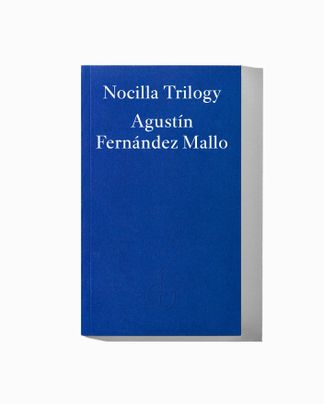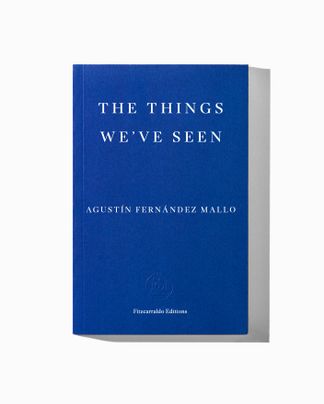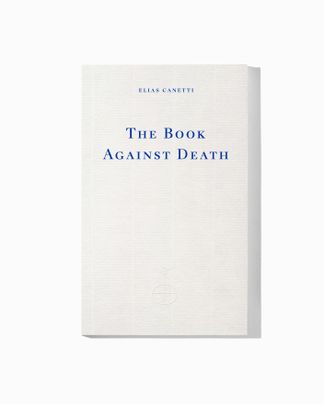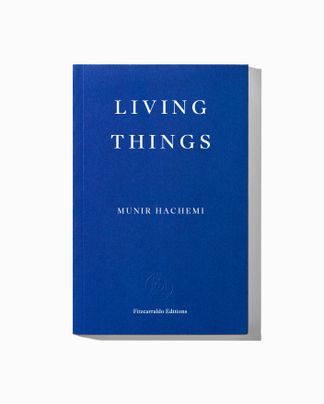In the wake of the Great Blackout, faced with the near-extinction of humanity, a pair of lovers speak to each other. They parse, with precision, with familiarity, the endless aspects of their love. Out of their dialogues, piece by piece, a composite image of love takes form, one that moves outwards beyond the realm of relationships and into metaphysics, geology, linguistics, AI.
Years previously, a writer and her husband, a Latin professor, stay in Venice while she works on a text. As they roam the city, strange occurrences accumulate, signalling that the world around them is heading towards a point of no return.
Blending fiction and essay, poetry and philosophy, Agustín Fernández Mallo’s The Book of All Loves is a startling, expansive work of imaginative agility, one that renders love unfamiliar so as to renew it, and makes the case for hope in the midst of a disintegrating present.
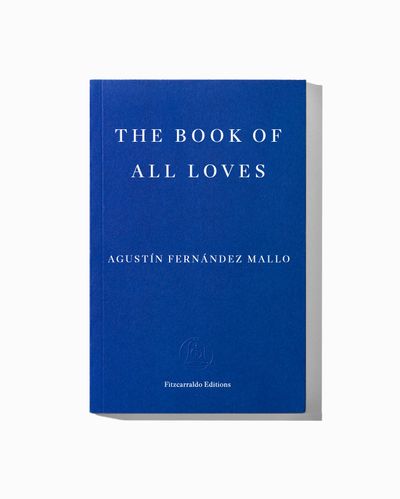
The Book of All Loves
Translated by Thomas Bunstead
French paperback with flaps, 192 pages
Published 14 February 2024
The Book of All Loves
Translated by Thomas Bunstead
Looking at the world in silence, and in silence writing what is seen. Writing the silence itself. This is what it is to love the world. (Silent love)
Where has it come from, this whole landscape of wounds?
– he says.
From bodies without passion, which are also landscape.
– she says.
The first inventory of colours generally agreed to be of any significance was compiled in around 1790, when the botanist Thaddäus Haenke, after numerous expeditions studying the flora of Mexico, Guatemala, New Zealand, the Mariana Islands and the Philippines, felt obliged to catalogue the hundreds of tones until then undetected in the sciences and arts alike. Haenke expanded the known palette from just a few hundred to 2,487 chromatic tones. He completed his map of colours in the same place he ended his days, Cochabamba, Peru, where he tended and studied – study also being a way of tending to things – the garden behind the house he built there. It was said by a number of those who attended his deathbed that what he really wanted to leave behind was not an inventory of colours, but one taking in the gamut of love’s tones, its every shade, saturation, texture and glittering. (Pantone love)
Our first kiss burned our tongues out completely, and yet still it burns on them.
– he says.
Paradoxical perfection in bodies that meet.
– she says.
There is a moment in the experience of love when you start to cut yourself on everything. On the edges of drawers and on the screen of your mobile phone, on your toothbrush and when you’re watering a house plant, when you put on your trousers and when you take them off, when you open a book or close a door, when you tie your shoelaces and when you adjust the thermostat on the central heating; even bars of soap and the handrails on buses cut you. Suddenly objects of all kinds want to sharpen their edges on you. (Blade love)
The first time I touched you it was like coming home. A home I’d never been in before.
– he says.
Since being with you, I’ve lost my fear of routine.
– she says.
The lowest manifestation of realism is the extrapolation of statistics about the future. The most naïve manifestation of nostalgia, meanwhile, is the use of those same statistics to make extrapolations about the past. When couples split up, unbeknownst to them, each takes one of these completely opposed approaches. (Statistical love)
After the Great Blackout, our hair suddenly turned white. Like the snow on these mountains, which fell one morning and has never gone away.
– she says.
Even polar bear fur isn’t white. If you look at each hair closely, one at a time, you’ll see that it’s transparent.
– he says.
The Vikings, voyaging to the Mediterranean from their frozen northern seas, did not do so hugging the coasts of what we nowadays call Europe. Rather they crossed the continent along the Rhine and other watercourses, skilfully connecting one to the next; navigating fresh water to join two bodies of salt water via the shortest possible route: a kind of cultural geodesic. Along the way they burned towns, animals and the land itself, plundering anything of value – but leaving the flowers on the waysides and, in the cases where they were embroidered, the drapery in people’s houses too. It was not that they disliked these things, but that they were invisible to them – the Viking eye untrained for detecting that class of object. Nor did they plunder the beaches themselves when they arrived in what is now Italy; the grains of sand were so smooth, so spherical and gleaming that they did not even see them. What kind of shortest-line-between-two-points is this, then, that ‘does not see things’? The birds migrating to this continent in the present day also bear in their sexual organs a layer of stamens and ancient minerals that they cannot see and yet scatter as they go. (Geodesic love)
When we don’t notice the night creeping up on us, it’s our vision that’s lacking, not the night.
– she says.
Since the Great Blackout, you’ve loved me in a different way, you’ve fed another flame.
– he says.
(…)
‘Stylistically and thematically The Book of All Loves is daringly hybrid, swimming in and out of streams of consciousness, monologue and dialogue, and studded throughout with imagined dictionary-style entries classifying love in its countless guises. But instead of érōs and agápē, Mallo warps, fractures and expands the concepts of his subject into increasingly esoteric forms…. Ever attentive to the manipulation of language, Bunstead’s translation is highly impressive, keeping smooth pace with the author in his fits of poetry and moments of philosophical contemplation…. Agustín Fernández Mallo’s rapturous, postapocalyptic study of love is, at its core, a study of us all.’
— Laura Garmeson, Times Literary Supplement
‘Here, a sense of menace and a kind of melancholy tension are beautifully realised in Mallo’s brooding prose.’
— Michael Cronin, Irish Times
‘The novel covers an enormous range of subjects – linguistics, metaphysics, geology, nature, poetry, artificial intelligence, deep time, philosophy – with a quality of thought that propels the reader to the book’s surprising conclusion…. The Book of All Loves is a sheer pleasure, a text that reminded our committee why we read, and what wonderful discoveries are available to us in the trade of bookselling.’
— 2024 Cercador Prize jury
‘There are certain writers whose work you turn to knowing you’ll find extraordinary things there. Borges is one of them, Bolaño another. Agustín Fernández Mallo has become one, too.’
— Chris Power, author of A Lonely Man
‘A protean taxonomy of love whose shape veers between three modes, that of commonplace book, gendered dialogue and metafiction. Agustín Fernández Mallo finds not one but many envelopes to contain the cosmos.’
— Jesse Ball, author of Autoportrait
‘The Book of All Loves defies definition. The prose gallops on from one shining brilliance to the next, both disarmingly playful and devastating. Gorgeous, melancholic, mysterious – it is a book to be read again, many times.’
— Claire Oshetsky, author of Chouette
‘In his Book of All Loves, Fernández Mallo offers us an encyclopaedia of loves, each one sounding – as if for the first time – as a pure tone, from an infinite spectrum of tones. Here is a book unlike any other, a book that recreates and regenerates love, even as it asks us whether it is strong enough to hold.’
— Amy Arnold, author of Lori & Joe
‘Mallo makes a hopeful and resounding claim: human love can even ritualise rubbish.’
— Tom Greany, Oxford Review of Books
‘The Book of All Loves is a deeply poetic novel … Fernández Mallo reflects on the present through the past, and projects us into a future where the conditions of the self, the environment, relationships and the body are all called into question.’
— El Mundo
‘Reading Agustín Fernández Mallo is the closest thing in literature to putting on a VR headset.’
— La Vanguardia
‘The Book of All Loves is at once an essay, an ode and a gospel, where two lovers become the link between one world ending and another being born, and using deep geological time to explain why some people stay with us our whole lives.’
— ABC España
‘The most original and powerful author of his generation in Spain.’
— Mathias Enard, author of The Annual Banquet of the Gravediggers’ Guild
‘One of the best writers in Spanish, with an absolutely unique style and fictional world.’
— Jorge Carrión, New York Times in Spanish
‘A strange and original sensibility at work – one that combines a deep commitment to the possibilities of art with a gonzo spirit and a complete absence of pretention.’
— Christopher Beha, Harper’s
‘[A] richly layered work that coheres into a deep and profound whole.’
— Joshua Rees, Buzz
Agustín Fernández Mallo was born in La Coruña in 1967, and is a qualified physicist. In 2000 he formulated a self-termed theory of ‘post-poetry’ which explores connections between art and science. His Nocilla Trilogy, published between 2006 and 2009, brought about an important shift in contemporary Spanish writing and paved the way for the birth of a new generation of authors, known as the ‘Nocilla Generation’. His essay Postpoesía: hacia un nuevo paradigma was shortlisted for the Anagrama Essay Prize in 2009. In 2018 his long essay Teoría general de la basura (cultura, apropiación, complejidad) was published by Galaxia Gutenberg, and in the same year his latest novel, The Things We’ve Seen, won the Biblioteca Breve Prize. In 2022, he was awarded the prestigious Eugenio Trías Essay Prize for La forma de la multitud. The Book of All Loves is his fifth book with Fitzcarraldo Editions.
Thomas Bunstead was born in London in 1982 and lives in Pembrokeshire, west Wales. He has translated leading Spanish-language writers, including Maria Gainza and Enrique Vila-Matas, and won various awards, including an O. Henry Prize and the McGinnis-Ritchie Award in 2022 for his translation of ‘The Mad People of Paris’ by Rodrigo Blanco Calderón. His own writing has appeared in publications such as the Brixton Review of Books, LitHub and the Paris Review, and he is a Royal Literary Fellow at Swansea University (2022–2024).

